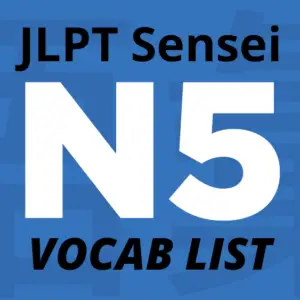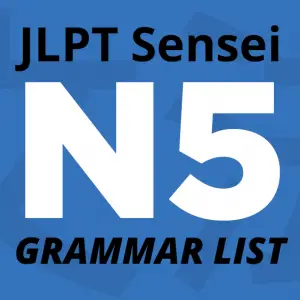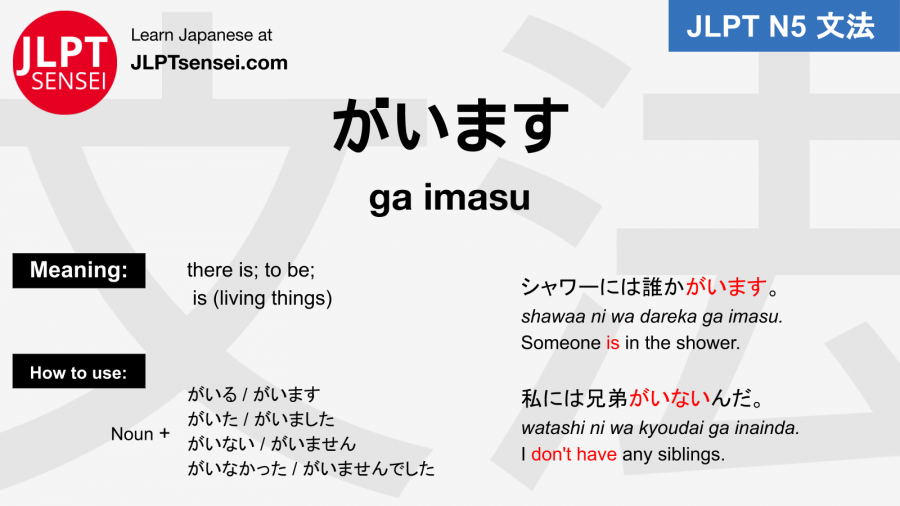Aprende gramática del idioma Japonés: がいます (ga imasu) & がいる (ga iru). Significado: used to say there is or something is for LIVING things.
The verb いる (iru) comes from 居る (iru), which is the verb for to be (for living things). However, when used in this grammar form, the hiragana form is used instead of the kanji form.
- This form can only be used with living things.
- For non-living things, use があります (ga arimasu) instead.
- The が is changed to a に/は for places.
- Can also mean to have or not have.
Let’s look at some basic examples.
Example A) to be がいます (ga imasu)
- シャワーには誰かがいます。
- shawaa ni wa dareka ga imasu.
- Someone is in the shower.
Example B) place にいます (ni imasu )
- 今どこにいますか?
- ima doko ni imasu ka?
- Where are you now?
Example C) to have がいます (ga imasu)
- 子どもがいますか?
- kodomo ga imasu ka?
- Do you have any children?
Example D) negative がいません (ga imasen)
- いいえ、子どもがいません。
- iie, kodomo ga imasen.
- No, I do not have any children.
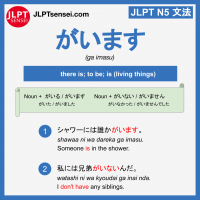
Click the image to download the flashcard.
Download all N5 grammar flashcards.
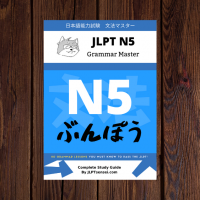
Download our complete
JLPT N5 Grammar Master E-book.
Access ALL extra downloads, ebooks, and study guides by supporting JLPT Sensei on Patreon.
がいます - Oraciones de ejemplos 例文
Cada oración de ejemplo incluye ayudas como la lectura (hiragana) en Japónes, la lectura en romaji, y la traducción en Español.
Da clic en el siguiente botón rojo para alternar todas las ayudas, o puedes dar clic en los botones individuales para mostrar únicamente las que desees ver.
Ejemplo #1
テーブルの下に猫がいる。
Ejemplo #2
あなたは彼氏がいるの?
Ejemplo #3
私には兄弟がいないんだ。
Ejemplo #4
弟一人妹一人がいます。
Ejemplo #5
その部屋に犬がいる。
Ejemplo #6
今学校にだれもいません。
Ejemplo #7
東京駅に観光者がいっぱいいる。
Vocabulario 語彙
| Kanji 漢字 |
Kana カナ |
English 英語 |
|---|---|---|
| 誰か | だれか | somebody |
| 今 | いま | where |
| どこ | where | |
| 子供 | こども | children |
| 私 | わたし | I; me |
| 猫 | ねこ | cat |
| 彼氏 | かれし | boyfriend |
| 兄弟 | きょうだい | siblings |
| 東京駅 | とうきょうえき | Tokyo station |
| 観光者 | かんこうしゃ | tourist |
| いっぱい | a lot | |
| もう | already | |
| 晩ご飯 | ばんごはん | dinner |
| 時間 | じかん | ~time |
| ですが | although | |
| お父さん | おとうさん | father; dad |
| まだ | still | |
| 事務所 | じむしょ | office |
Ver todas las lecciones de gramática del JLPT N5
